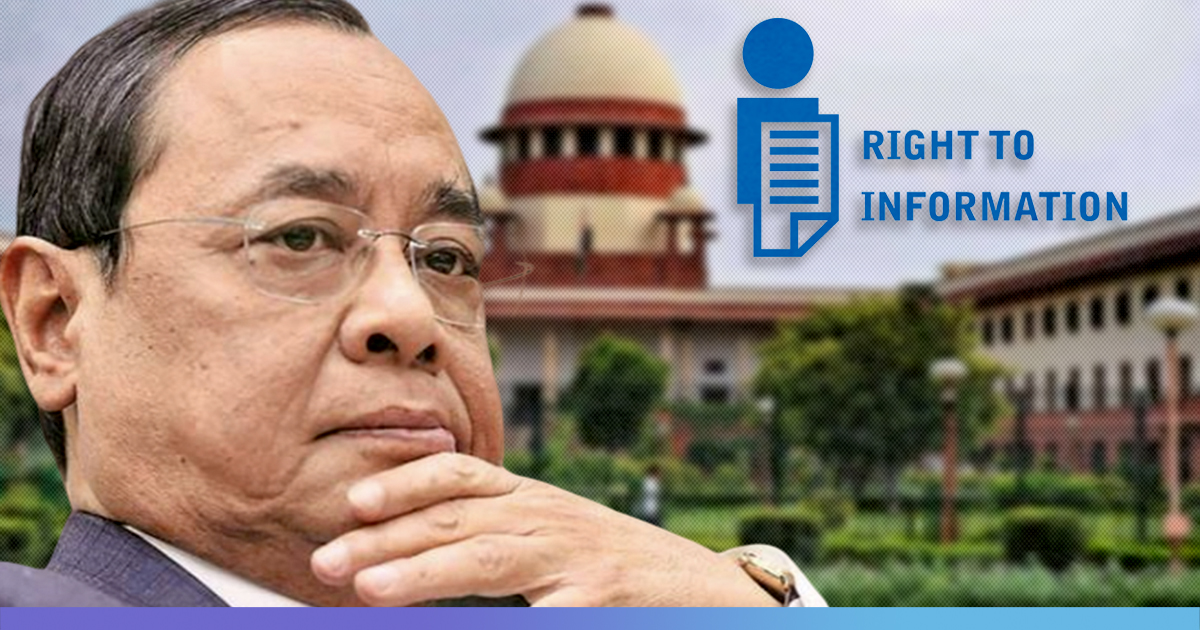
Breaking: Office Of Chief Justice Of India Under RTI, Conditions Applied
13 Nov 2019 10:03 AM GMT
‘Transparency doesn’t undermine judicial independency’, Supreme Court says on Wednesday while upholding the Delhi High Court judgement which ruled that office of Chief Justice comes under the purview of Right to Information Act (RTI).
The five-judge constitution bench, headed by Chief Justice Ranjan Gogoi who retires on November 17, also dismissed the three appeals filed by the Secretary-General of the Supreme Court and the Central Public Information officer of the apex court. Other members of the bench included Justices N V Ramana, D Y Chandrachud, Deepak Gupta and Sanjiv Khanna.
The Supreme Court, however, said that confidentiality and right to privacy have to be maintained and added that RTI can’t be used for as a tool of surveillance. It also said only names of judges recommended by the collegium can be disclosed, not the reasons.
A five-judge constitution bench had on April 4 reserved its verdict on the appeals filed in 2010 by the Supreme Court Secretary-General and its Central Public Information Officer against the high court and the Central Information Commission’s (CIC’s) orders.
Key Highlights
- The SC has upheld that the office of CJI is a public authority under the transparency law, Right to Information Act
- SC cautions that RTI cannot be used as a tool of surveillance
- Judicial independence has to be kept in mind while dealing with transparency
As all eyes were set on the Supreme Court this week as it is going to announce the judgement on four of the most controversial cases that remained in headlines. However, today the highest court of the nation will review its own case as CJI Ranjan Gogoi four-judge bench is going to pronounce verdict on whether or not the SC should fall under the purview of the RTI.
RTI remains to be a bone of contention for many politicians and bureaucrats as it empowers the citizens to hold public institutions accountable by accessing the relevant information. The RTI recently got a major blow from the Centre after the Modi-led BJP government introduced amendments on the RTI act under Right To Information Amendment Bill, 2019.
Hence, SC’s defining judgment on the RTI will indeed alter the democratic narrative of India.
SC Under Purview Of RTI
The Indian judiciary remained aloof from the RTI Act since its inception. The judiciary was exempted as lawmakers believed that opening collegium to RTI will be detrimental to judicial independence.
When the proceeding was undergoing in April 2019, Attorney General KK Venugopal said to media that “Information such as whether all judges have filed their assets with the CJI or not could be shared, provided public interest outweighed the judge’s right to privacy and reputation.”
Besides, he also claimed that it would have a chilling effect on consultations with the judges who might be involved in the process of not holding forth their views at all for the fear of being embarrassed later.
What is Right To Information? How It Came Into Being?
RTI was passed during Congress rule in 2005 as a fundamental right of the citizens. The act emboldens citizens’ right to access to information under the control of public authorities, in order to promote transparency and accountability in the working of every public institution.
The act was passed after the pressure put by Mazdoor Kisan Shakti Sangathan (MKSS), spearheaded by social activist, Aruna Roy, on the then government to hold the public functionaries accountable and to contain corruption, especially in the public domains.
MKSS forced the government to bring the law on accessing information as the Public Works Department had failed to disperse wages of labourers and had denied them the information on the same.
Every day, over 4800 RTI applications are filed. In the first ten years of the commencement of the act over 17,500,000 applications were filed under RTI.
Major Setback To RTI
Commonwealth Human Rights Initiative (CHRI) data points to over 310 cases across India where people were either attacked, murdered, physically or mentally harassed or had their property damaged because of the information they sought under RTI. The data throws up over 50 alleged murders and two suicides that were directly linked with RTI applications filed.
However, as a blow to the already vulnerable act, the Centre has introduced RTI Amendment Bill, 2019. According to the bill, the Chief Information Commissioners and the Information Commissioners, both Centre and state, will come under the ambit of the Centre. The Centre will unilaterally decide the tenure, terms and salaries of these officials and what information to be given out to the citizens. The officials who overlook at the functioning of the RTI will be overlooked by the Centre, hence, diminishing the power held by the common citizens.
The citizens are no more vested with the independence, transparency, status and authority over the public institutions but will now be functioning as one of the departments answerable eventually to the central government.
Also Read: Post Ayodhya, CJI Ranjan Gogoi To Deliver Four More Crucial Verdicts Before Retirement On Nov 17
 All section
All section













